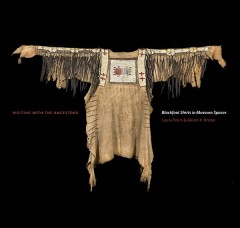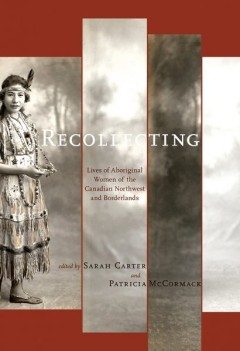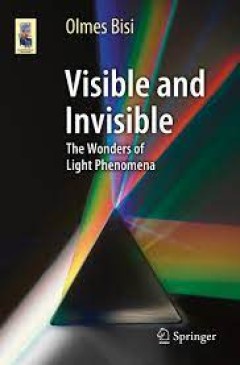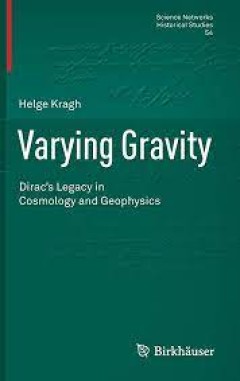Filter by

Visiting With the Ancestors Blackfoot Shirts in Museum Spaces
In 2010, five magnificent Blackfoot shirts, now owned by the University of Oxford’s Pitt Rivers Museum, were brought to Alberta to be exhibited at the Glenbow Museum, in Calgary, and the Galt Museum, in Lethbridge. The shirts had not returned to Blackfoot territory since 1841, when officers of the Hudson’s Bay Company acquired them. The shirts were later transported to England, where they h…
- Edition
- -
- ISBN/ISSN
- 9781771990370.01
- Collation
- -
- Series Title
- -
- Call Number
- 10.5 x 10, 232 pages

Screening Nature and Nation The Environmental Documentaries of the National …
The stunning portrayals of the Canadian landscape in the documentaries produced by the National Film Board of Canada not only influenced cinematic language, but shaped our perception of the environment. In the early days of the organization, nature films produced by the NFB supported the Canadian government’s nation-building project and show the state as an active participant in the cultural …
- Edition
- -
- ISBN/ISSN
- 9781771993357.01
- Collation
- -
- Series Title
- -
- Call Number
- 6x9, 232 pages

Reel Time Movie Exhibitors and Movie Audiences in Prairie Canada, 1896 to 1986
In this authoritative work, Seiler and Seiler argues that the establishment and development of moviegoing and movie exhibition in Prairie Canada is best understood in the context of changing late-nineteenth-century and early-twentieth-century social, economic, and technological developments. From the first entrepreneurs who attempted to lure customers in to movie exhibition halls, to the digita…
- Edition
- -
- ISBN/ISSN
- 9781926836997.01
- Collation
- -
- Series Title
- -
- Call Number
- 397 pages

Recollecting Lives of Aboriginal Women of the Canadian Northwest and Borderl…
Some essays focus on individuals—a trader, a performer, a non-human woman. Other essays examine cohorts of women—wives, midwives, seamstresses, nuns. Authors look beyond the documentary record and standard representations of women, drawing on records generated by the women themselves, including their beadwork, other material culture, and oral histories. Exploring the constraints and boundar…
- Edition
- -
- ISBN/ISSN
- 9781897425824.01
- Collation
- -
- Series Title
- The West Unbound: Social and Cultural Studies
- Call Number
- 432 pages

Wartime Schooling and Education Policy in the Second World War Catholic Educ…
This book deals with the development of private secondary schooling during the Second World War in Belgium. It focuses on how the German occupier used education to gain acceptance of the regime, and discusses the attitudes of Belgian education authorities, schools, teachers and pupils towards the German occupation. Suggesting that the occupation forced Belgian education authorities, such as the…
- Edition
- -
- ISBN/ISSN
- 978-1-137-52011-1
- Collation
- XII, 220
- Series Title
- -
- Call Number
- -

Vladimir Solov’ëv's Justification of the Moral Good Moral Philosophy
This new English translation of Solov’ëv’s principal ethical treatise, written in his later years, presents Solov’ëv’s mature views on a host of topics ranging from a critique of individualistic ethical systems to the death penalty, the meaning of war, animal rights, and environmentalism. Written for the educated public rather than for a narrow circle of specialists, Solov’ëv’s w…
- Edition
- -
- ISBN/ISSN
- 978-3-319-12775-0
- Collation
- LXX, 435
- Series Title
- -
- Call Number
- -

Visible and Invisible The Wonders of Light Phenomena
Light phenomena have intrigued humankind since prehistory. Think of the rainbow, a sunset on the sea, a game of shadows. Humans have always used light for their own needs, from cooking food to illuminating a room. However, light is not only limited to what we can see with our eyes. The invisible part of the electromagnetic spectrum is broad and dynamic. This book outlines the mysteries and w…
- Edition
- -
- ISBN/ISSN
- 978-3-319-09825-8
- Collation
- XXI, 314
- Series Title
- -
- Call Number
- -

Vehicular Ad-hoc Networks for Smart Cities First International Workshop, 2014
Vehicular communication is a key technology in intelligent transportation systems. For many years now, the academic and industrial research communities have been investigating these communications in order to improve efficiency and safety of future transportation. Vehicular networking offers a wide variety of applications, including safety applications as well as infotainment applications. T…
- Edition
- -
- ISBN/ISSN
- 978-981-287-158-9
- Collation
- X, 93
- Series Title
- -
- Call Number
- -

Varying Gravity Dirac’s Legacy in Cosmology and Geophysics
The main focus of this book is on the interconnection of two unorthodox scientific ideas, the varying-gravity hypothesis and the expanding-earth hypothesis. As such, it provides a fascinating insight into a nearly forgotten chapter in both the history of cosmology and the history of the earth sciences. The hypothesis that the force of gravity decreases over cosmic time was first proposed by …
- Edition
- -
- ISBN/ISSN
- 978-3-319-24379-5
- Collation
- 4 b/w illustrations, 12 illustrations in colour
- Series Title
- -
- Call Number
- -

Goodlands A Meditation and History on the Great Plains
Amer-European settlement of the Great Plains transformed bountiful Native soil into pasture and cropland, distorting the prairie ecosystem as it was understood and used by the peoples who originally populated the land. Settlers justified this transformation with the unexamined premise of deficiency, according to which the Great Plains region was inadequate in flora and fauna and the region lack…
- Edition
- -
- ISBN/ISSN
- 9781897425985.01
- Collation
- -
- Series Title
- The West Unbound: Social and Cultural Studies
- Call Number
- 388 pages
 Computer Science, Information & General Works
Computer Science, Information & General Works  Philosophy & Psychology
Philosophy & Psychology  Religion
Religion  Social Sciences
Social Sciences  Language
Language  Pure Science
Pure Science  Applied Sciences
Applied Sciences  Art & Recreation
Art & Recreation  Literature
Literature  History & Geography
History & Geography